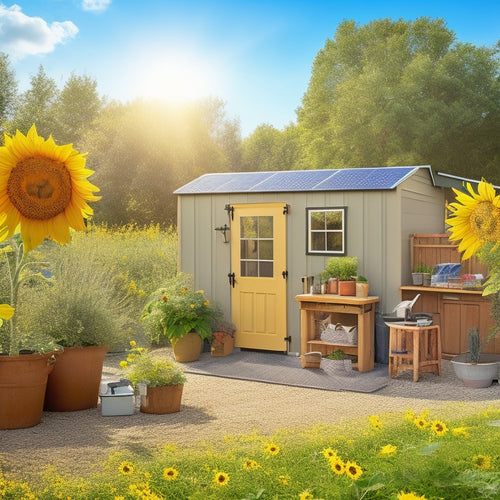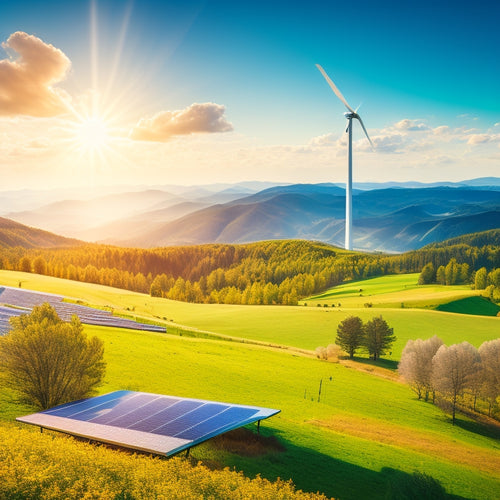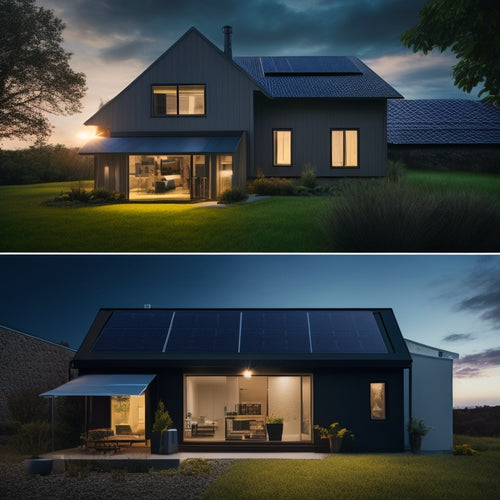
Are Absorption Refrigerators Eco-Friendly
Share
Absorption refrigerators are indeed eco-friendly. They employ renewable energy sources, like solar and waste heat, which reduces reliance on conventional electricity. This approach lowers carbon emissions and promotes energy efficiency. By consuming less power and operating on natural refrigerants like ammonia, these systems minimize their environmental impact. Lifecycle analysis shows they generate fewer greenhouse gases, further supporting their sustainability. Although choosing the right size is essential for ideal performance, absorption refrigerators contribute to a healthier environment. If you investigate further, you'll uncover additional understandings into their benefits and operational considerations.
At a Glance
- Absorption refrigerators utilize renewable energy sources like solar and waste heat, significantly reducing reliance on electricity and lowering carbon footprints.
- They operate efficiently with minimal energy consumption, promoting energy independence and reducing monthly utility bills.
- Natural refrigerants used in these systems have a lower global warming potential compared to synthetic options, aligning with eco-friendly practices.
- Lifecycle analysis indicates that absorption refrigerators generate fewer greenhouse gases and require less energy during operation, contributing to a healthier environment.
- Their design allows for varied energy inputs, making them suitable for both on-grid and off-grid applications while enhancing sustainability.
Low Energy Consumption Benefits
When you consider absorption refrigerators, their energy source efficiency stands out as a significant advantage.
These systems often use heat sources like solar or waste heat, reducing your reliance on electricity and lowering overall demand.
Additionally, the integration of renewable energy systems, such as solar, can enhance this efficiency even further by providing a sustainable energy source for your home.
As a result, you'll not only save on energy costs but also contribute to a more sustainable energy environment energy independence benefits.
Energy Source Efficiency
Utilizing natural energy sources, absorption refrigerators stand out for their impressive energy efficiency, often consuming considerably less power than conventional models. This efficiency is largely attributed to absorption technology, which utilizes heat—rather than electricity—making it a more sustainable option.
You'll find that many absorption refrigerators display high efficiency ratings, indicating their ability to provide effective cooling with minimal energy input. In practical terms, this means you can enjoy the benefits of refrigeration without the burden of high energy bills.
For instance, if you choose to power your absorption refrigerator with renewable energy sources, such as solar or geothermal, you can greatly reduce your carbon footprint while keeping your food and beverages cool. This approach aligns with a growing desire for eco-friendly solutions that promote independence from traditional energy grids.
Moreover, the low energy consumption of absorption refrigerators contributes to a more resilient energy future. With such innovations, you're not just investing in an appliance; you're embracing a lifestyle that prioritizes environmental stewardship and resource efficiency.
Reduced Electricity Demand
Absorption refrigerators greatly reduce electricity demand, a key benefit that aligns with the growing emphasis on sustainability. By utilizing heat sources like gas or solar energy, these systems can operate independently of traditional electrical grids. This unique feature not only lowers your energy consumption but also translates into considerable cost savings over time.
| Benefit | Details | Impact |
|---|---|---|
| Reduced Electricity | Operates on alternative heat sources | Lower monthly utility bills |
| Maintenance Requirements | Minimal upkeep compared to compressors | Less time and money spent |
| Environmental Impact | Decreased reliance on fossil fuels | Contributes to sustainability |
You'll find that absorption refrigerators require less electricity than conventional models, which can lead to a more manageable lifestyle focused on freedom from high energy bills. Additionally, with fewer mechanical parts, the maintenance requirements are greatly lowered, allowing you to enjoy the benefits without constant oversight. This combination of reduced electricity demand and low maintenance makes absorption refrigerators an appealing option for those who prioritize eco-friendliness and cost efficiency.
Sustainable Cooling Solutions
When considering sustainable cooling solutions, it's essential to investigate energy source alternatives that can minimize reliance on fossil fuels.
Evaluating options like solar-powered refrigerators helps to understand their eco-friendly benefits.
Analyzing the environmental impact of these options helps you understand their long-term viability and benefits.
Energy Source Alternatives
Exploring energy source alternatives can greatly enhance the sustainability of cooling solutions. You'll find that absorption refrigerators can employ various eco-friendly energy sources, leading to reduced reliance on traditional electricity. Two intriguing alternatives are solar heating and waste heat recovery.
Here's a quick overview of these alternatives:
| Energy Source | Description | Benefits |
|---|---|---|
| Solar Heating | Utilizes sunlight to generate heat. | Reduces electricity costs, renewable. |
| Waste Heat | Captures excess heat from industrial processes. | Increases efficiency, lowers emissions. |
| Biomass | Uses organic materials for energy. | Sustainable, reduces landfill waste. |
| Geothermal Energy | Leverages heat from the earth. | Reliable, low environmental impact. |
Environmental Impact Assessment
Evaluating the environmental impact of cooling solutions is imperative for understanding their role in sustainable development. When you consider absorption refrigerators, applying sustainability metrics can provide meaningful perspectives into their overall footprint.
These metrics often include resource consumption, energy efficiency, and waste generation, which are essential for evaluating long-term viability. Conducting a lifecycle analysis helps you grasp the environmental implications from production to disposal.
For instance, while absorption refrigerators may use less electricity compared to traditional units, you must consider the sourcing of materials and the emissions associated with manufacturing processes. This approach reveals whether the energy savings during operation genuinely offset the environmental costs incurred earlier.
Moreover, understanding the refrigerants used is critical. Some absorption refrigerators employ natural refrigerants, which tend to have lower global warming potential compared to synthetic alternatives.
However, the environmental impact doesn't stop there; you need to assess end-of-life disposal methods, which can greatly affect sustainability.
Unique Cooling Mechanism
Absorption refrigerators employ natural refrigerants, which greatly reduce environmental impact compared to traditional systems.
Additionally, these units can be paired with renewable energy storage solutions like deep cycle batteries to enhance their eco-friendly benefits by ensuring a consistent energy supply.
You're also likely to notice their versatility in energy sources, as they can operate using heat from various fuels or solar energy.
This unique cooling mechanism not only promotes sustainability but also enhances energy efficiency in diverse applications.
Natural Refrigerants Usage
Natural refrigerants play an important role in the unique cooling mechanism of absorption refrigerators, driving their eco-friendly appeal. Unlike traditional refrigerants, which can contribute to ozone depletion and global warming, natural refrigerants such as water, ammonia, and hydrocarbons present eco-friendly alternatives. These substances have a low environmental impact, making them more sustainable choices for refrigeration systems.
When you consider the operational efficiency of absorption refrigerators, the use of natural refrigerants becomes even more significant. These refrigerants facilitate a process where heat is absorbed and transferred, creating a cooling effect without relying on harmful chemicals. The natural properties of these substances allow for effective heat exchange, which is vital for maintaining ideal temperatures in various applications.
Moreover, the adoption of natural refrigerants aligns with global efforts to reduce greenhouse gas emissions. By choosing absorption refrigerators that employ these eco-friendly alternatives, you not only support a healthier planet but also benefit from their energy-efficient design.
As more industries and consumers prioritize sustainability, the shift towards natural refrigerants represents a meaningful step toward a more environmentally responsible future in refrigeration technology.
Energy Source Versatility
The versatility of energy sources in absorption refrigerators enhances their eco-friendly profile, complementing the use of natural refrigerants. These systems can operate on various energy inputs, making them suitable for both on-grid and off-grid applications. Whether you're capturing solar power or employing waste heat from industrial processes, absorption refrigerators adapt seamlessly to renewable energy sources.
| Energy Source | Suitability for Absorption Refrigerators | Applications |
|---|---|---|
| Solar Thermal | Excellent | Off-grid homes, cabins |
| Natural Gas | Good | Urban areas, mobile units |
| Biomass | Fair | Remote locations, farms |
| Geothermal Energy | Excellent | Sustainable buildings |
| Waste Heat Recovery | Very Good | Industrial processes |
This diversity in energy sourcing not only reduces reliance on fossil fuels but also aligns with global sustainability goals. You can see how absorption refrigerators stand out when considering their ability to employ readily available renewable energy. Their adaptability makes them particularly appealing for those seeking independence from conventional energy systems, allowing for a more sustainable lifestyle.
Selecting Based on Size
When selecting an absorption refrigerator, it's essential to take into account both the space available and your specific capacity requirements.
As you evaluate your options, think about how integrating renewable energy solutions can enhance the eco-friendliness of your refrigeration choice.
You'll want to measure the intended installation area to guarantee a proper fit, while also evaluating how much cooling capacity you need based on your usage.
Balancing these factors will help you choose a model that meets your eco-friendly goals without compromising on efficiency or convenience.
Space Considerations
Choosing the right size for an absorption refrigerator is crucial, especially when space is limited. You need to contemplate not just the physical dimensions but also how it fits into your overall layout. Effective space enhancement can improve functionality and accessibility, allowing you to make the most of your available area.
When evaluating your space, be mindful of installation constraints, such as proximity to power sources, ventilation requirements, and the refrigerator's weight. A larger unit might offer more features but can also overwhelm smaller spaces, leading to inefficiencies. Conversely, a compact model can free up useful room, but it may lack the capabilities you require.
It's essential to measure your designated area accurately before making a selection. Visualizing the refrigerator's placement within your space can help you foresee any potential issues.
Capacity Requirements
Understanding your capacity requirements is vital for selecting the right absorption refrigerator size for your needs. The size you choose will directly influence its efficiency and functionality.
Begin by evaluating your space and the volume of items you intend to store. Design considerations, such as the layout of your kitchen or storage area, play an important role in determining the best size.
Next, consider performance metrics like cooling efficiency and energy consumption. Larger models may seem appealing, but they can lead to wasted energy if you don't regularly fill them.
An oversized unit may not cycle effectively, causing temperature fluctuations that can compromise food safety. Conversely, a too-small refrigerator may struggle to meet your storage demands, leading to overcrowding and inefficient cooling.
Reduced Refrigerant Emissions
When you consider absorption refrigerators, you'll notice they contribute to reduced refrigerant emissions, which directly impacts greenhouse gas levels.
By utilizing natural refrigerants, these systems minimize the release of harmful substances into the atmosphere.
As a result, you can expect a more sustainable cooling solution that aligns with eco-friendly practices.
Lower Greenhouse Gas Emissions
Lower greenhouse gas emissions are a significant advantage of absorption refrigerators, especially when it comes to reducing refrigerant emissions. Unlike traditional vapor-compression systems that rely on hydrofluorocarbons (HFCs), which have high global warming potential, absorption refrigerators use natural refrigerants like ammonia or water. This shift not only lowers the carbon footprint but also minimizes the risk of harmful leaks associated with synthetic refrigerants.
Lifecycle analysis reveals that absorption refrigerators contribute to a greener future by generating fewer greenhouse gases throughout their operational lifespan. The absence of HFCs means that these systems are less likely to release potent greenhouse gases during production, use, or disposal. By choosing absorption technology, you're opting for a system that aligns with eco-friendly principles.
Moreover, these refrigerators often require less energy to operate, further reducing emissions linked to electricity generation.
As you weigh your choices for refrigeration, consider how absorption refrigerators can help you adopt a more sustainable lifestyle. In a world increasingly concerned about climate change, making informed decisions that reduce your environmental impact is essential. Embracing absorption refrigerators can be a step toward a more responsible future.
Frequently Asked Questions
How Do Absorption Refrigerators Compare to Traditional Refrigerators in Efficiency?
When you compare absorption refrigerators to traditional ones, you'll notice that energy consumption often differs, with absorption models usually being less efficient. However, their cooling performance can be adequate for specific applications and environments.
What Materials Are Typically Used in Absorption Refrigeration Systems?
Did you know that around 90% of absorption refrigerators use water and ammonia? Their material composition affects their environmental impact; understanding these elements can help you make informed choices about energy-efficient cooling systems in your life.
Can Absorption Refrigerators Be Powered by Renewable Energy Sources?
Yes, you can power absorption refrigerators with renewable energy sources like solar and geothermal energy. By utilizing these sustainable options, you reduce reliance on fossil fuels and support a more environmentally-friendly refrigeration solution for your needs.
What Is the Lifespan of an Absorption Refrigerator Compared to Conventional Models?
On average, absorption refrigerators last around 15-25 years, while conventional models typically last 10-20 years. They often require less energy consumption and lower maintenance requirements, making them a longer-lasting choice for some consumers.
Are There Any Safety Concerns Associated With Using Absorption Refrigerators?
When using absorption refrigerators, you should adhere to safety regulations and follow proper maintenance practices. Regular checks can prevent leaks and guarantee safe operation, minimizing potential hazards associated with refrigerants and heat sources in these systems.
Explore More
To summarize, absorption refrigerators offer a sustainable alternative to traditional cooling systems, thanks to their low energy consumption and reduced refrigerant emissions. For instance, a family living off-grid could greatly lower their carbon footprint by using an absorption refrigerator powered by solar energy. By selecting the right size and understanding their unique cooling mechanism, you can contribute to a greener environment while enjoying efficient refrigeration. Embracing these eco-friendly solutions benefits both you and the planet.
Related Posts
-

Building an Emergency Backup Solar Power System in 5 Essential Steps
Building an emergency backup solar power system involves five key steps. First, assess your daily energy needs to ide...
-

Renewable Energy Solutions to Reduce Your Carbon Footprint
To reduce your carbon footprint, adopting renewable energy solutions is key. Using solar panels or wind turbines can ...
-

Cost of Home Solar Battery
You're looking to invest in a home solar battery to reduce your grid reliance, but you're curious about the cost. The...


